|
|
|
Sort Order |
|
|
|
Items / Page
|
|
|
|
|
|
|
| Srl | Item |
| 1 |
ID:
131624


|
|
|
|
|
| Publication |
2014.
|
| Summary/Abstract |
European Union (EU) interventions in conflict countries tend to focus on governance reforms of political and economic frameworks instead of the geopolitical context or the underlying power asymmetries that fuel conflict. They follow a liberal pattern often associated with northern donors and the UN system more generally. The EU's approach diverges from prevalent governance paradigms mainly in its engagement with social, identity and socio-economic exclusion. This article examines the EU's 'peace-as-governance' model in Cyprus, Georgia, Palestine and Bosnia and Herzegovina. These cases indicate that a tense and contradictory strategic situation may arise from an insufficient redress of underlying conflict issues.
|
|
|
|
|
|
|
|
|
|
|
|
|
|
|
|
| 2 |
ID:
170520
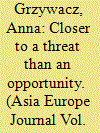

|
|
|
|
|
| Summary/Abstract |
Chinese initiatives of a geopolitical nature are being more and more frequently analyzed in the literature. At the same time, it is pointed out that at least since 2012 China has been pursuing an assertive and active foreign policy. Due to the importance of the Belt and Road Initiative project and also the 16 + 1 cooperation in the Central and Eastern Europe region, it is worth analyzing what the perception of China in this region is on the example of Poland. The study attempts to answer the question of how the increase in China’s importance and its international engagement are perceived in Poland. The analysis of Polish papers published in 2003–2017 shows, and this is an argument, that Polish researchers more frequently present China in the categories of a threat and apply research terminology and tools within the realistic theory of international relations and this image is being reinforced, especially after 2013. The analytical framework of “China as a threat” and “China as an opportunity” occurring frequently in research is placed in this paper in theories of international relations.
|
|
|
|
|
|
|
|
|
|
|
|
|
|
|
|
| 3 |
ID:
172382
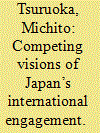

|
|
|
|
|
| Summary/Abstract |
The state and direction of Japan’s international engagement can best be understood as a competition between the ‘Japan first’ and ‘global Japan’ schools of thought. In light of the ever worsening security environment surrounding Japan, the gap between the Japan first school advocating a focus on the immediate needs of Japan’s territorial defence and the global Japan school arguing for more global engagement is widening. The competition between the two will continue to shape the direction of Japan’s foreign and security posture – and importantly, the global Japan school is far from winning, contrary to what Abe’s hyperactive diplomacy might suggest.
|
|
|
|
|
|
|
|
|
|
|
|
|
|
|
|
| 4 |
ID:
107803
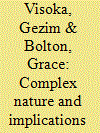

|
|
|
|
|
| Publication |
2011.
|
| Summary/Abstract |
This article examines the implications of two distinct phases of international engagement in Kosovo. We argue that a number of flaws developed during UNMIK's administration (1999-2008), which continue to undermine Kosovo's stability. We then disentangle the complex inter-institutional relations between ICO, EULEX, UNMIK and the OSCE. Indeed, their incompatible positions towards Kosovo's status results in a lack of clarity, coordination and coherence that weaken Kosovo within four policy areas: Kosovo's international recognition and participation, the rule of law, inter-ethnic relations and the fate of North Kosovo. While these shortcomings could be viewed as 'unintended consequences', we argue more broadly that the Kosovo case illustrates the limits of liberal peacebuilding and the tensions and implications of strategic peacebuilding.
|
|
|
|
|
|
|
|
|
|
|
|
|
|
|
|
| 5 |
ID:
130666
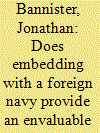

|
|
|
| 6 |
ID:
132930
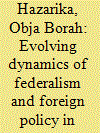

|
|
|
|
|
| Publication |
2014.
|
| Summary/Abstract |
Although, the central government in India has been constitutionally empowered to decide on foreign affairs, this article has attempted to portray that sub-national units have influenced and affected external engagements to a certain extent. The central government as well as foreign audiences have acknowledged the role of the states of India in external engagements and have often included them in discussions and negotiations relating to foreign affairs. Sub-national diplomacy has taken varied manifestations in India. First, states have embarked on economic diplomacy with foreign audiences. Secondly, states sharing an international border have influenced neighbourhood policy and thirdly, regional parties, which have served as coalition partners at the centre have often leveraged their status to exert pressure on the centre in certain foreign policy decisions. The centre, being the final authority on external affairs in India, must continue to conduct foreign policy with an aim to secure the national interest of the country as well as to ensure that the legitimate interests and concerns of the states are adequately accommodated.
|
|
|
|
|
|
|
|
|
|
|
|
|
|
|
|
| 7 |
ID:
131423
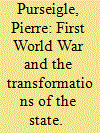

|
|
|
|
|
| Publication |
2014.
|
| Summary/Abstract |
Scholars of the First World War have long recognized the critical role played by the state in leading, organizing and managing the mobilization of belligerent societies, and the state's transformations have testified to the impact of industrialized warfare. Since the late 1980s, however, the cultural turn that largely accounts for the renewal and dynamism of First World War studies has shifted the emphasis away from the wartime state and its operations. Its study relatively suffered as a result. This article aims to bring the state back into the centre of the historiographical discussion, since its transformations testified to the nature and political impact of industrialized warfare. The article therefore focuses on three critical aspects of the relationship between state and society: the deployment of coercion, the expression of national solidarity and the redefinition of sovereignty. It demonstrates how the logic of mass participation in modern warfare transformed both the contours and the foundations of the state. To do so, the article draws on a renewed engagement with social scientific literature and the sociology of the state in particular.
|
|
|
|
|
|
|
|
|
|
|
|
|
|
|
|
| 8 |
ID:
132021
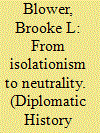

|
|
|
|
|
| Publication |
2014.
|
| Summary/Abstract |
This essay assesses the pitfalls of relying on isolationism to describe American political culture during the 1920s and 1930s and proposes that the concept of neutrality offers a more useful framework for understanding how Americans struggled with their place in a world at war. Americans had long worried about foreign entanglements, but what lent the debates after World War I their special urgency and potency was a sense that one important option in the traditional conduct of international relations-neutrality-had become unhinged from its moorings. Understanding the shifting meanings, and ultimately the perceived demise of neutrality as a viable form of statecraft, points toward a new way to narrate the turning points and political alliances of the interwar years. It also helps to explain why, since the 1930s, Americans have become more readily embroiled in military conflicts overseas despite their recurring doubts about the price of such engagement.
|
|
|
|
|
|
|
|
|
|
|
|
|
|
|
|
| 9 |
ID:
131420
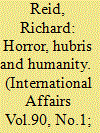

|
|
|
|
|
| Publication |
2014.
|
| Summary/Abstract |
This article examines the international engagement with Africa from the First World War and the apex of colonial rule through to the present day. It is argued that there have been dramatic shifts throughout this period-from increasing interventionism on the part of the colonial state, to decolonization and the emergence of nation-states with independent foreign policy programmes, to the predations and influences of the Cold War, to the developmentalism and humanitarianism of the contemporary era. Yet, there has also been marked continuity in terms of policy, perception and practice. In particular, Africa has long been seen in terms of economic opportunity-a place where markets and raw materials abound-and of military and political threat, a place in which intrinsic instability makes external intervention both desirable and inevitable. While immediate contexts have changed over time, the international engagement with the continent remains essentially economic and military. A concern for democratization and development represents a relatively new element, although even this can be traced to the paternalistic humanitarianism of the colonial era and, earlier still, moral stances toward Africa in the nineteenth century.
|
|
|
|
|
|
|
|
|
|
|
|
|
|
|
|
| 10 |
ID:
139887
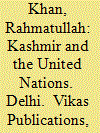

|
|
|
|
|
| Publication |
DelhI, Vikas Publications, 1969.
|
| Description |
vii, 199p.hbk
|
|
|
|
|
|
|
|
|
|
|
|
Copies: C:1/I:0,R:0,Q:0
Circulation
| Accession# | Call# | Current Location | Status | Policy | Location |
| 002072 | 954.6/KHA 002072 | Main | On Shelf | General | |
|
|
|
|
| 11 |
ID:
092197
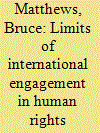

|
|
|
|
|
| Publication |
2009-2010.
|
| Summary/Abstract |
The final three years of Sri Lanka's civil war precipitated much concern about human rights violations. Late in 2006, a Presidential Commission of Inquiry (the Justice Udalagama COI) was charged with re-examining 16 problematic cases where initial investigatory procedures had failed or were inconclusive. An unusual invitation was extended to a small body of foreign observers whose task was to confirm whether the COI was meeting accepted international standards. With this initiative, the government of Sri Lanka could also show the world community that human rights issues were being taken seriously. This essay analyzes various challenges that arose from that experience. It argues that there are critical cultural and technical limitations to international external engagement in situations where human rights are in question.
|
|
|
|
|
|
|
|
|
|
|
|
|
|
|
|
| 12 |
ID:
167880
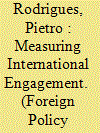

|
|
|
|
|
| Summary/Abstract |
The literature on Latin American foreign policy analysis has long called for more empirical and theoretical rigor. Because foreign policy making is a multifaceted concept, there are a wide array of outcomes that scholars use interchangeably to proxy it, thus leading to unclear results on its main determinants. Using Brazil as a case study, we offer a methodological tool that, we believe, can contribute to further closing this gap. We developed an index that quantifies the level of foreign policy engagement, taking into account the decisions made by different governmental actors for 192 country dyads along sixteen years. We confirm that Brazil managed to expand its international relations with both the Global South and Global North and that domestic variables that the Workers’ Party ideology played a major role in drove the shift toward giving preeminence to countries in the Global South. The results support the usefulness of our tool, which deepens our understanding of foreign policy making in Latin America, bringing new insights to the discussion.
|
|
|
|
|
|
|
|
|
|
|
|
|
|
|
|
| 13 |
ID:
122085
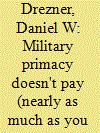

|
|
|
|
|
| Publication |
2013.
|
| Summary/Abstract |
Acommon argument among scholars and policymakers is that America's military preeminence and deep international engagement yield significant economic benefits to the United States and the rest of the world. Ostensibly, military primacy, beyond reducing security tensions, also encourages economic returns through a variety of loosely articulated causal mechanisms. A deeper analytical look reveals the causal pathways through which military primacy is most likely to yield economic returns: geoeconomic favoritism, whereby the military hegemon attracts private capital in return for providing the greatest security and safety to investors; direct geopolitical favoritism, according to which sovereign states, in return for living under the security umbrella of the military superpower, voluntarily transfer resources to help subsidize the costs of hegemony; and the public goods benefits that flow from hegemonic stability. A closer investigation of these causal mechanisms reveals little evidence that military primacy attracts private capital. The evidence for geopolitical favoritism seems more robust during periods of bipolarity than unipolarity. The evidence for public goods benefits is strongest, but military predominance plays only a supporting role in that logic. While further research is needed, the aggregate evidence suggests that the economic benefits of military hegemony have been exaggerated in policy circles. These findings have significant implications for theoretical debates about the fungibility of military power and should be considered when assessing U.S. fiscal options and grand strategy for the next decade.
|
|
|
|
|
|
|
|
|
|
|
|
|
|
|
|
| 14 |
ID:
131445
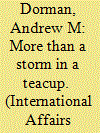

|
|
|
|
|
| Publication |
2014.
|
| Summary/Abstract |
In September 2014 the people of Scotland will vote on whether to become an independent nation, with the defence and security of Scotland proving to be one of the more vociferous areas of debate. This article argues that defence and security implications of this referendum are far more fundamental than either the 'yes' or 'no' campaigns have admitted. It makes four points. First, it suggests that the Scottish government's plans for defence and security in NATO and the EU are at odds with its proposed armed forces and that Scotland may well find itself having to make far greater commitments to defence to assure its allies. Second, it argues that a vote for independence will represent a game-changing event for the remainder of the United Kingdom's defence and security, which will have significant consequences for the United Kingdom's partners and allies in NATO, the European Union and elsewhere. Third, the article contends that even a vote against independence will have a long-term impact, in that the 'West Lothian question' and Scottish support for nuclear disarmament influence the 2015 Strategic Defence and Security Review. Finally, the article highlights how this issue has revealed weaknesses in the think-tank and academic communities, particularly in Scotland. The independence vote does, therefore, represent 'more than a storm in a tea cup' and thus there needs to be far greater engagement with these issues within the United Kingdom and elsewhere
|
|
|
|
|
|
|
|
|
|
|
|
|
|
|
|
| 15 |
ID:
132094
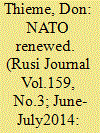

|
|
|
|
|
| Publication |
2014.
|
| Summary/Abstract |
As the NATO summit in Wales approaches, the US debate about the country's international strategy becomes more and more relevant, particularly in the light of recent developments in Eastern Europe and discussions about the role of the Atlantic Alliance post Afghanistan. Don Thieme explores some of the most pressing issues dominating this debate and suggests six reasons why the US needs to remain engaged in a renewed NATO.
|
|
|
|
|
|
|
|
|
|
|
|
|
|
|
|
| 16 |
ID:
133134
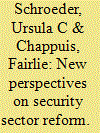

|
|
|
|
|
| Publication |
2014.
|
| Summary/Abstract |
This special issue identifies new directions in research on the consequences of international involvement in security sector reform (SSR). Both empirically and theoretically, the focus lies on the so far neglected role of local agency and domestic power constellations. The introductory article maps out different ways to analyse the external-domestic interaction dynamics that structure the often contentious and asymmetric encounters between international and local interests and demands in SSR processes. It makes the case for moving beyond a state-centric approach to the study of security governance in areas of limited statehood and for engaging more closely with the layered, mixed or hybrid security orders that can result from external engagement in domestic reform contexts.
|
|
|
|
|
|
|
|
|
|
|
|
|
|
|
|
| 17 |
ID:
133629
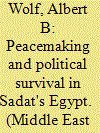

|
|
|
|
|
| Publication |
2014.
|
| Summary/Abstract |
What are the domestic political consequences of peacemaking for dictators? The conventional wisdom suggests that nations are better off reaching settlements that allow them to avoid the costs of war.1 The effectiveness of cooperation with autocracies is of interest to policy makers and international-relations theorists alike. Debates over issues such as the First Step Agreement with Iran or U.S.-China policy have focused on the effectiveness of engagement (defined as attempts to influence the behaviors of a target state through positive inducements).2 States sometimes cooperate with their rivals, expecting that engagement will bolster the political fortunes of moderates in the target regime
|
|
|
|
|
|
|
|
|
|
|
|
|
|
|
|
| 18 |
ID:
152384
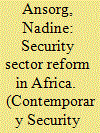

|
|
|
|
|
| Summary/Abstract |
Many African states have security sector reform (SSR) programs. These are often internationally funded. But how do such programs account for previously existing security institutions and the security needs of local communities? This article examines SSR all over Africa to assess local ownership and path dependency from a New Institutionalist perspective. It finds that SSR, particularly in post-conflict countries, tends to be driven by ideas and perceptions of international donors promoting generalized blueprints. Often, such programs only account in a very limited way for path-dependent aspects of security institutions or the local context. Hence, the reforms often lack local participation and are thus not accepted by the local community eventually.
|
|
|
|
|
|
|
|
|
|
|
|
|
|
|
|
| 19 |
ID:
131698
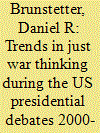

|
|
|
|
|
| Publication |
2014.
|
| Summary/Abstract |
In this article, I explore the place of the just war tradition in US foreign policy by examining the use of just war language in the presidential debates in 2000 (Bush-Gore), 2004 (Bush-Kerry), 2008 (McCain-Obama), and 2012 (Obama-Romney). While critics focus on the use and abuse of just war language as rhetorical gloss to persuade the public an upcoming conflict is morally legitimate while serving the national interest, the debates showcase just war principles as part of a language of critical engagement. Each debate cycle allowed for critical reflection on the foreign policy decisions and just war philosophy of the incumbent president. During the time period I examine, the process of critical engagement identified two moral shortcomings of the past - the failure to act to stop the genocide in Rwanda and the premature use of force in Iraq. These perceived failures catalysed convergence, across party lines, on the way some jus ad bellum principles were understood: Just cause as including the moral obligation to intervene in some way to stop genocide and the renewed salience of the principle of last resort. There remained, however, stark differences in the way legitimate authority was understood.
|
|
|
|
|
|
|
|
|
|
|
|
|
|
|
|
| 20 |
ID:
133622
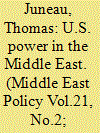

|
|
|
|
|
| Publication |
2014.
|
| Summary/Abstract |
It has become common to hear that American power in the Middle East is waning. The recent U.S.-Russia deal on the elimination of Syria's chemical-weapons program, for example, has even led some to talk of U.S. weakness in the region.2 This article instead argues that American power in the Middle East is not declining but is, in fact, slightly increasing, due principally to U.S. military domination, the strong positions of its regional partners and the stagnation or decline of its rivals. It is true that U.S. ambition in the Middle East is diminishing, albeit only slightly. This is distinct, however, from power. A pronounced and durable decrease in U.S. regional ambition, moreover, is not sustainable. Because of structural pressures, it is difficult for the United States to more than marginally reduce its regional presence. It is not losing its grip on the Middle East but trying, with only partial success, to loosen it.3
|
|
|
|
|
|
|
|
|
|
|
|
|
|
|
|
|
|
|
|
|